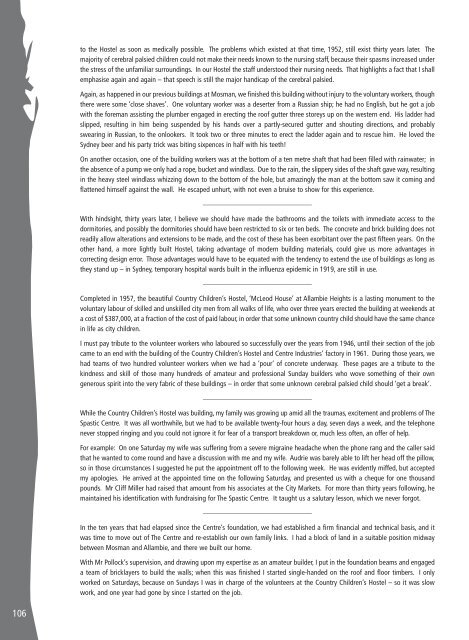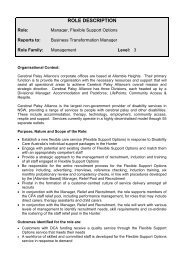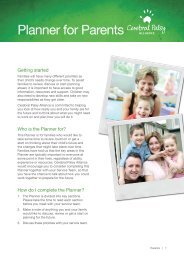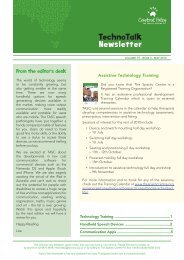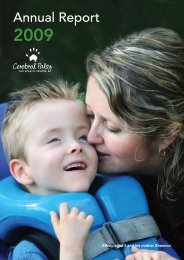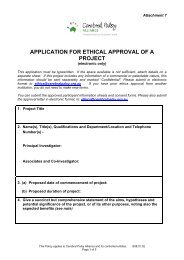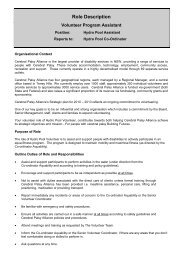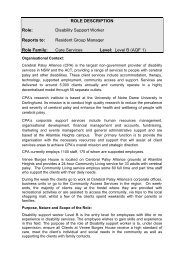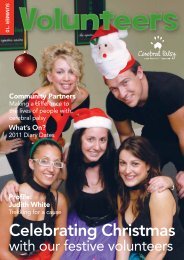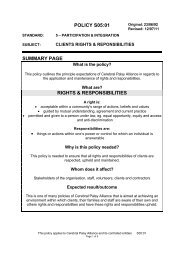'Nothing is impossible' - Part 2, chapter 4-8 - The Spastic Centre
'Nothing is impossible' - Part 2, chapter 4-8 - The Spastic Centre
'Nothing is impossible' - Part 2, chapter 4-8 - The Spastic Centre
Create successful ePaper yourself
Turn your PDF publications into a flip-book with our unique Google optimized e-Paper software.
to the Hostel as soon as medically possible. <strong>The</strong> problems which ex<strong>is</strong>ted at that time, 1952, still ex<strong>is</strong>t thirty years later. <strong>The</strong><br />
majority of cerebral palsied children could not make their needs known to the nursing staff, because their spasms increased under<br />
the stress of the unfamiliar surroundings. In our Hostel the staff understood their nursing needs. That highlights a fact that I shall<br />
emphas<strong>is</strong>e again and again – that speech <strong>is</strong> still the major handicap of the cerebral palsied.<br />
Again, as happened in our previous buildings at Mosman, we fin<strong>is</strong>hed th<strong>is</strong> building without injury to the voluntary workers, though<br />
there were some ‘close shaves’. One voluntary worker was a deserter from a Russian ship; he had no Engl<strong>is</strong>h, but he got a job<br />
with the foreman ass<strong>is</strong>ting the plumber engaged in erecting the roof gutter three storeys up on the western end. H<strong>is</strong> ladder had<br />
slipped, resulting in him being suspended by h<strong>is</strong> hands over a partly-secured gutter and shouting directions, and probably<br />
swearing in Russian, to the onlookers. It took two or three minutes to erect the ladder again and to rescue him. He loved the<br />
Sydney beer and h<strong>is</strong> party trick was biting sixpences in half with h<strong>is</strong> teeth!<br />
On another occasion, one of the building workers was at the bottom of a ten metre shaft that had been filled with rainwater; in<br />
the absence of a pump we only had a rope, bucket and windlass. Due to the rain, the slippery sides of the shaft gave way, resulting<br />
in the heavy steel windlass whizzing down to the bottom of the hole, but amazingly the man at the bottom saw it coming and<br />
flattened himself against the wall. He escaped unhurt, with not even a bru<strong>is</strong>e to show for th<strong>is</strong> experience.<br />
______________________________<br />
With hindsight, thirty years later, I believe we should have made the bathrooms and the toilets with immediate access to the<br />
dormitories, and possibly the dormitories should have been restricted to six or ten beds. <strong>The</strong> concrete and brick building does not<br />
readily allow alterations and extensions to be made, and the cost of these has been exorbitant over the past fifteen years. On the<br />
other hand, a more lightly built Hostel, taking advantage of modern building materials, could give us more advantages in<br />
correcting design error. Those advantages would have to be equated with the tendency to extend the use of buildings as long as<br />
they stand up – in Sydney, temporary hospital wards built in the influenza epidemic in 1919, are still in use.<br />
______________________________<br />
Completed in 1957, the beautiful Country Children’s Hostel, ‘McLeod House’ at Allambie Heights <strong>is</strong> a lasting monument to the<br />
voluntary labour of skilled and unskilled city men from all walks of life, who over three years erected the building at weekends at<br />
a cost of $387,000, at a fraction of the cost of paid labour, in order that some unknown country child should have the same chance<br />
in life as city children.<br />
I must pay tribute to the volunteer workers who laboured so successfully over the years from 1946, until their section of the job<br />
came to an end with the building of the Country Children’s Hostel and <strong>Centre</strong> Industries’ factory in 1961. During those years, we<br />
had teams of two hundred volunteer workers when we had a ‘pour’ of concrete underway. <strong>The</strong>se pages are a tribute to the<br />
kindness and skill of those many hundreds of amateur and professional Sunday builders who wove something of their own<br />
generous spirit into the very fabric of these buildings – in order that some unknown cerebral palsied child should ‘get a break’.<br />
______________________________<br />
While the Country Children’s Hostel was building, my family was growing up amid all the traumas, excitement and problems of <strong>The</strong><br />
<strong>Spastic</strong> <strong>Centre</strong>. It was all worthwhile, but we had to be available twenty-four hours a day, seven days a week, and the telephone<br />
never stopped ringing and you could not ignore it for fear of a transport breakdown or, much less often, an offer of help.<br />
For example: On one Saturday my wife was suffering from a severe migraine headache when the phone rang and the caller said<br />
that he wanted to come round and have a d<strong>is</strong>cussion with me and my wife. Audrie was barely able to lift her head off the pillow,<br />
so in those circumstances I suggested he put the appointment off to the following week. He was evidently miffed, but accepted<br />
my apologies. He arrived at the appointed time on the following Saturday, and presented us with a cheque for one thousand<br />
pounds. Mr Cliff Miller had ra<strong>is</strong>ed that amount from h<strong>is</strong> associates at the City Markets. For more than thirty years following, he<br />
maintained h<strong>is</strong> identification with fundra<strong>is</strong>ing for <strong>The</strong> <strong>Spastic</strong> <strong>Centre</strong>. It taught us a salutary lesson, which we never forgot.<br />
______________________________<br />
In the ten years that had elapsed since the <strong>Centre</strong>’s foundation, we had establ<strong>is</strong>hed a firm financial and technical bas<strong>is</strong>, and it<br />
was time to move out of <strong>The</strong> <strong>Centre</strong> and re-establ<strong>is</strong>h our own family links. I had a block of land in a suitable position midway<br />
between Mosman and Allambie, and there we built our home.<br />
With Mr Pollock’s superv<strong>is</strong>ion, and drawing upon my expert<strong>is</strong>e as an amateur builder, I put in the foundation beams and engaged<br />
a team of bricklayers to build the walls; when th<strong>is</strong> was fin<strong>is</strong>hed I started single-handed on the roof and floor timbers. I only<br />
worked on Saturdays, because on Sundays I was in charge of the volunteers at the Country Children’s Hostel – so it was slow<br />
work, and one year had gone by since I started on the job.<br />
106


